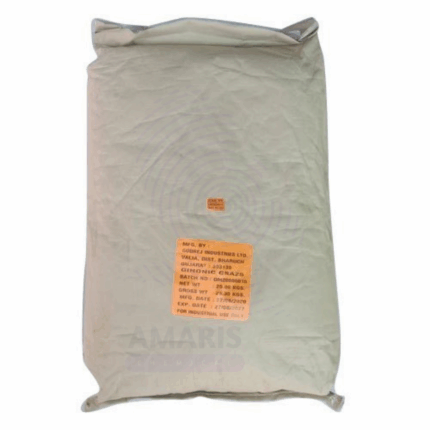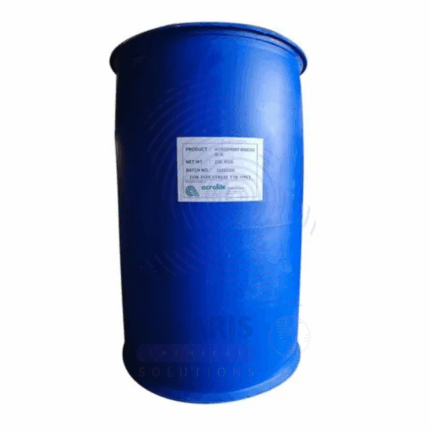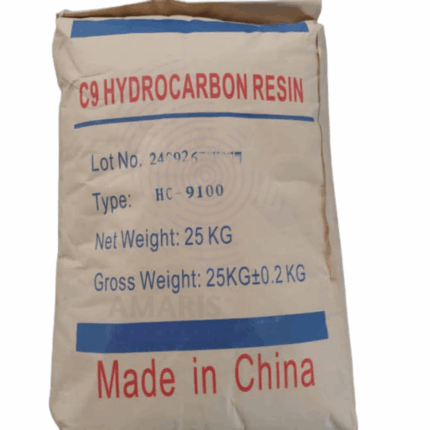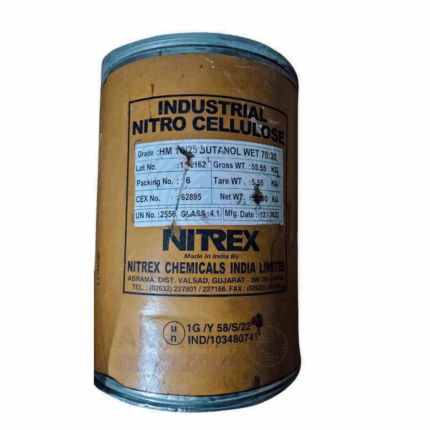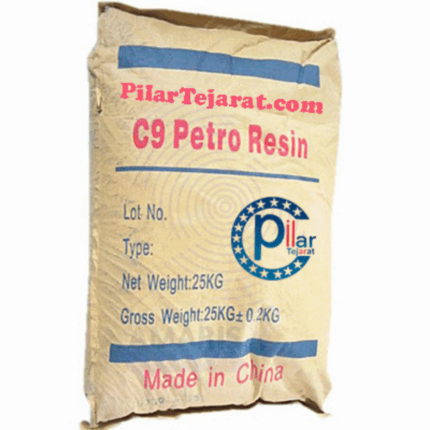Setalux C1184 XX60
Setalux C1184 XX60 is a high-performance alkyd resin used primarily in the production of durable paints and coatings. Known for its excellent adhesion, gloss, and flexibility, this resin forms tough, weather-resistant films suitable for various industrial and decorative applications. It provides enhanced chemical resistance, drying properties, and compatibility with a range of pigments and additives. Setalux C1184 XX60 is favored for use in metal coatings, wood finishes, and protective coatings, offering long-lasting protection and aesthetic appeal.
Setalux C1184 XX60 Uses
Primary Uses
Paints and Coatings
- Used as a binder resin in alkyd-based paints for interior and exterior metal surfaces.
- Provides excellent adhesion and flexibility in wood varnishes and enamels.
- Enhances weather resistance and gloss in decorative and industrial coatings.
- Utilized in maintenance coatings for machinery, vehicles, and infrastructure.
Printing Inks
- Serves as a film-forming component in certain solvent-based printing inks for enhanced durability and adhesion.
Adhesives and Sealants
- Incorporated in formulations requiring strong bonding and flexibility, particularly for industrial adhesive applications.
Secondary Uses
Automotive Refinishing
- Used in specialty coatings and primers to improve durability and finish quality.
Marine Coatings
- Suitable for certain protective coatings requiring resistance to saltwater and harsh environments.
Art Supplies
- Occasionally employed in artist paints and varnishes for improved gloss and drying properties.
Basic Identification Attributes
- Chemical Name (IUPAC): Alkyd resin (modified polyester resin)
- Common/Trade Name: Setalux C1184 XX60
- CAS Number: Proprietary formulation
- HS Code: 3907.99
- Synonyms: Alkyd resin C1184, modified alkyd binder
Physical & Chemical Properties
- Physical State: Liquid
- Color & Odor: Amber to yellowish, mild characteristic odor
- Viscosity: Medium to high, depending on formulation
- Solubility: Soluble in organic solvents such as xylene, toluene, and ketones
- Density: Approx. 1.0 – 1.2 g/cm³
Safety & Hazard Attributes
- GHS Classification: Flammable liquid; may cause skin and eye irritation
- Toxicity: Low to moderate; avoid prolonged exposure
- Exposure Limits: Follow occupational safety standards for solvents and resins
Storage & Handling Attributes
- Storage Conditions: Store in tightly closed containers in a cool, dry, and well-ventilated area away from ignition sources
- Container Type: Supplied in metal drums or plastic containers
- Shelf Life: Typically 12–24 months under recommended storage conditions
- Handling Precautions: Use protective gloves, goggles, and work in well-ventilated
spaces
Regulatory & Compliance Attributes
- Complies with relevant paint and coating safety standards such as ASTM and REACH.
- Meets VOC regulations for solvent-based coatings in major markets including the EU and USA.
- Adheres to GHS classification and labeling requirements for safe handling and transportation.
- Manufactured following Good Manufacturing Practices (GMP) and industry quality standards.
- Safety data sheets (SDS) provided according to international regulatory frameworks.
Environmental & Health Impact
- Biodegradability: Slowly biodegradable; depends on formulation specifics
- Ecotoxicity: Low to moderate; avoid discharge into waterways
Bioaccumulation: Not significant
Safety Handling Precautions
- PPE Required: Gloves, goggles, and protective clothing recommended
- Handling Guidelines: Avoid skin and eye contact; ensure proper ventilation to minimize inhalation exposure
- Storage Measures: Keep containers tightly closed and away from heat and sparks
First Aid Measures
- Inhalation: Move to fresh air; seek medical attention if breathing difficulties occur
- Skin Contact: Wash with soap and water; seek medical advice if irritation develops
- Eye Contact: Rinse with water for at least 15 minutes; seek medical help if irritation persists
- Ingestion: Rinse mouth; do not induce vomiting; get medical help immediately
Firefighting Measures
- Fire Hazards: Flammable liquid; vapors may form explosive mixtures with air
- Extinguishing Media: Foam, dry chemical, CO₂, or water spray
- Special Precautions: Use full protective equipment and self-contained breathing apparatus
Hazardous Combustion Products: Carbon oxides, hydrocarbons


 Preservatives(food)
Preservatives(food) Flavor Enhancers
Flavor Enhancers Acidulants
Acidulants Sweeteners
Sweeteners Antioxidants
Antioxidants Colorants(food)
Colorants(food) Nutraceutical Ingredients (food)
Nutraceutical Ingredients (food) Nutrient Supplements
Nutrient Supplements Emulsifiers
Emulsifiers
 Collectors
Collectors Dust Suppressants
Dust Suppressants Explosives and Blasting Agents
Explosives and Blasting Agents Flocculants and Coagulants
Flocculants and Coagulants Frothers
Frothers Leaching Agents
Leaching Agents pH Modifiers
pH Modifiers Precious Metal Extraction Agents
Precious Metal Extraction Agents
 Antioxidants(plastic)
Antioxidants(plastic) Colorants (Pigments, Dyes)
Colorants (Pigments, Dyes) Fillers and Reinforcements
Fillers and Reinforcements Flame Retardants
Flame Retardants Monomers
Monomers Plasticizers
Plasticizers Polymerization Initiators
Polymerization Initiators Stabilizers (UV, Heat)
Stabilizers (UV, Heat)
 Antifoaming Agents
Antifoaming Agents Chelating Agents
Chelating Agents Coagulants and Flocculants
Coagulants and Flocculants Corrosion Inhibitors
Corrosion Inhibitors Disinfectants and Biocides
Disinfectants and Biocides Oxidizing Agents
Oxidizing Agents pH Adjusters
pH Adjusters Scale Inhibitors( water)
Scale Inhibitors( water)
 Antioxidants(cosmetic)
Antioxidants(cosmetic) Emollients
Emollients Fragrances and Essential Oils
Fragrances and Essential Oils Humectants
Humectants Preservatives
Preservatives Surfactants(cosmetic)
Surfactants(cosmetic) Thickeners
Thickeners UV Filters
UV Filters
 Fertilizers
Fertilizers Soil Conditioners
Soil Conditioners Plant Growth Regulators
Plant Growth Regulators Animal Feed Additives
Animal Feed Additives Biostimulants
Biostimulants Pesticides (Herbicides, Insecticides, Fungicides)
Pesticides (Herbicides, Insecticides, Fungicides)
 Active Pharmaceutical Ingredients (APIs)
Active Pharmaceutical Ingredients (APIs) Excipients
Excipients Solvents(pharmaceutical)
Solvents(pharmaceutical) Antibiotics
Antibiotics Antiseptics and Disinfectants
Antiseptics and Disinfectants Vaccine Adjuvants
Vaccine Adjuvants Nutraceutical Ingredients (pharmaceutical)
Nutraceutical Ingredients (pharmaceutical) Analgesics & Antipyretics
Analgesics & Antipyretics
 Analytical Reagents
Analytical Reagents Solvents(lab)
Solvents(lab) Chromatography Chemicals
Chromatography Chemicals Spectroscopy Reagents
Spectroscopy Reagents microbiology-and-cell-culture-reagents
microbiology-and-cell-culture-reagents Molecular Biology Reagents
Molecular Biology Reagents Biochemical Reagents
Biochemical Reagents Inorganic and Organic Standards
Inorganic and Organic Standards Laboratory Safety Chemicals
Laboratory Safety Chemicals Specialty Laboratory Chemicals(Special Laboratory Equipment)
Specialty Laboratory Chemicals(Special Laboratory Equipment)
 Demulsifiers
Demulsifiers Hydraulic Fracturing Fluids
Hydraulic Fracturing Fluids Scale Inhibitors(oil)
Scale Inhibitors(oil) Surfactants(oil)
Surfactants(oil) Drilling Fluids
Drilling Fluids
 Dyes and Pigments
Dyes and Pigments Bleaching Agents
Bleaching Agents Softening Agents
Softening Agents Finishing Agents
Finishing Agents Antistatic Agents
Antistatic Agents
 Admixtures
Admixtures Waterproofing Agents
Waterproofing Agents Sealants and Adhesives
Sealants and Adhesives Curing Compounds
Curing Compounds Concrete Repair Chemicals
Concrete Repair Chemicals Anti-Corrosion Coatings
Anti-Corrosion Coatings
 Surfactants(cleaning)
Surfactants(cleaning) Builders
Builders Enzymes
Enzymes Solvents (Cleaning)
Solvents (Cleaning) Fragrances
Fragrances
 Electronic Chemicals
Electronic Chemicals Catalysts
Catalysts Lubricants
Lubricants Photographic Chemicals
Photographic Chemicals Refrigerants
Refrigerants Automotive chemicals
Automotive chemicals Pyrotechnic Chemicals
Pyrotechnic Chemicals
 Biodegradable Surfactants
Biodegradable Surfactants Bio-based Solvents
Bio-based Solvents Renewable Polymers
Renewable Polymers Carbon Capture Chemicals
Carbon Capture Chemicals Wastewater Treatment Chemicals
Wastewater Treatment Chemicals
 Pigments
Pigments Solvents(paint)
Solvents(paint) Specialty Coatings
Specialty Coatings Binders/Resins
Binders/Resins Additives
Additives Driers
Driers Anti-Corrosion Agents
Anti-Corrosion Agents Functional Coatings
Functional Coatings Application-Specific Coatings
Application-Specific Coatings
 Fresh Herbs
Fresh Herbs Ground Spices
Ground Spices Whole Spices
Whole Spices Spice Blends
Spice Blends Dried Herbs
Dried Herbs
 Leavening Agents
Leavening Agents Dough Conditioners
Dough Conditioners Flour Treatments
Flour Treatments Fat Replacers
Fat Replacers Decoratives
Decoratives Preservatives(baking)
Preservatives(baking)
 Plasticizers & Softeners
Plasticizers & Softeners Reinforcing Agents
Reinforcing Agents Adhesion Promoters
Adhesion Promoters Vulcanizing Agents
Vulcanizing Agents Antidegradants
Antidegradants Blowing Agents
Blowing Agents Fillers & Extenders
Fillers & Extenders Accelerators & Retarders
Accelerators & Retarders

